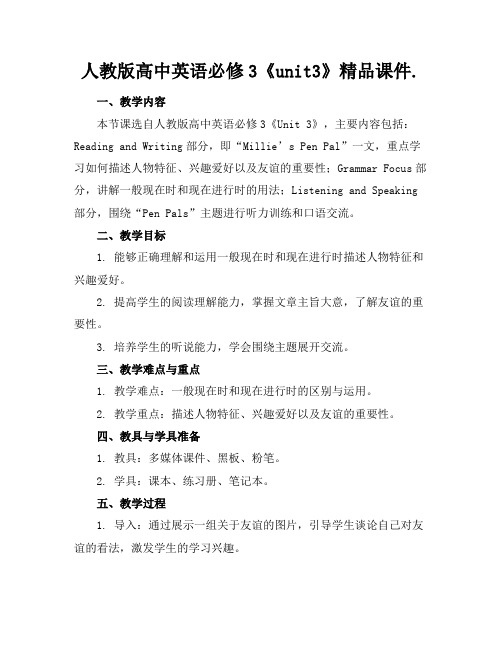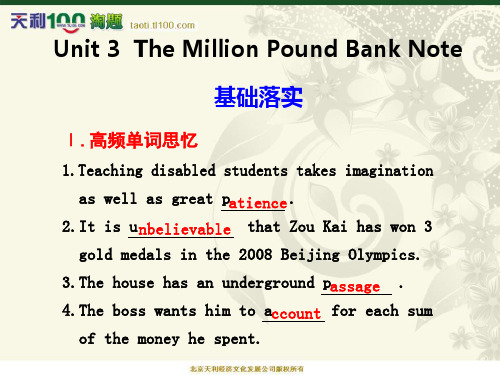高中高中英语必修3unit3重点词语及短语解析教案
新人教版英语必修三_Unit 3 单词讲义

Unit3单词讲义diverse词性:形容词中文意思:多种多样的,不同的英文释义:consisting of a variety of different types词源:来自拉丁语diversus,意为“分开的”例句:The park has a diverse range of plants and animals.固定搭配:diverse cultures(多元文化),diverse interests(不同的兴趣)近义词:various, different, varieddiversity词性:名词中文意思:多样性,差异性英文释义:the state or quality of being diverse; the condition of having many different kinds词源:来自拉丁语diversitas,意为“不同,变化”例句:The school promotes diversity and inclusivity among its students.固定搭配:cultural diversity(文化多样性),diversity of opinion(意见的多样性)近义词:variety, difference, variationfortune词性:名词中文意思:财富,运气,命运英文释义:a large amount of money or property; luck or chance; the events that will happen to someone in their life 词源:来自古法语fortun,意为“幸运,好运”例句:She inherited a fortune from her grandfather.固定搭配:good fortune(好运),fortune cookie(幸运饼干)近义词:wealth, luck, fatenachos词性:名词中文意思:玉米片,墨西哥炸玉米片英文释义:tortilla chips covered with cheese and other toppings, typically served as a snack or appetizer词源:来自墨西哥纳瓦特尔语nacoztli,意为“玉米面饼”例句:I ordered some nachos with extra jalapenos.固定搭配:nachos with cheese(奶酪玉米片),nachos bar(玉米片吧)近义词:tortilla chips, tortilla stripschip词性:名词/动词中文意思:碎片,芯片;削,切,碎裂英文释义:a thin slice cut off or broken off from something; a small piece of something that is broken off or separated; to break into pieces or become damaged in this way词源:来自中古英语chippen,意为“砍,劈”例句:He accidentally dropped his phone and the screen chipped.固定搭配:chip card(芯片卡),chipboard(木屑板),chip away at(逐步削减)近义词:fragment, break, crackSpicy:词性:形容词中文意思:加有香料的;辛辣的英文释义:having a strong taste of spices; hot and pungent to the taste词源:来自拉丁语"speciosus",意为"有吸引力的"例句:I love eating spicy food.固定搭配:spicy food(辛辣的食物),spicy flavor(辛辣的味道)近义词:pungent, hot, piquantEthnic:词性:形容词中文意思:具有民族特色的;异国风味的;民族的;种族的英文释义:relating to a particular national, racial, or tribal group词源:来自希腊语"ethnos",意为"种族,民族"例句:She likes to wear ethnic clothes.固定搭配:ethnic cuisine(民族美食),ethnic music(民族音乐)近义词:national, racial, tribalAdmit:词性:动词中文意思:承认;准许进入(或加入)英文释义:to agree that something is true; to allow someone to enter a place or join a group 词源:来自拉丁语"admitti",意为"准许进入"例句:He admitted his mistake.固定搭配:admit defeat(承认失败),admit one's guilt(承认罪行)近义词:acknowledge, confess, permitDefinitely:词性:副词中文意思:肯定;确实英文释义:used to emphasize that something is certain or sure词源:来自拉丁语"definitus",意为"确定的"例句:I will definitely come to your party.固定搭配:definitely yes(肯定地是),definitely no(肯定地不是)近义词:certainly, surely, unquestionablyOccur:词性:动词中文意思:发生;出现英文释义:if an event or situation occurs, it happens or exists词源:来自拉丁语"occurrere",意为"发生,出现"例句:The accident occurred at midnight.固定搭配:occur to someone(某人突然想到),occur regularly(定期发生)downtown词性:副词、名词中文意思:市中心的,市区的英文释义:in or to the central business district of a city词源:down(下)+ town(城镇)例句:I work in downtown New York City.固定搭配:downtown area, downtown district, downtown shopping近义词:city center, urban areamission词性:名词中文意思:使命,任务,代表团英文释义:a task given to someone as part of their job or duties词源:来自拉丁语“missio”,意为“派遣”例句:The mission of this project is to improve education in rural areas.固定搭配:mission statement, on a mission, fulfill one's mission近义词:task, assignment, responsibilitydistrict词性:名词中文意思:地区,行政区,管区英文释义:an area that is controlled by a particular government or organization 词源:来自拉丁语“districtus”,意为“分开的,划分的”例句:The police officer patrols his district every night.固定搭配:district attorney, school district, fire district近义词:area, region, zonecomic词性:形容词、名词中文意思:滑稽的,喜剧的,漫画的英文释义:causing laughter; relating to comedy; a book or magazine with pictures and words that tell a story 词源:来自拉丁语“comicere”,意为“模仿”例句:The comedian's performance was very comical.固定搭配:comic book, comic strip, comic relief近义词:funny, humorous, cartoonishafterwards词性:副词中文意思:之后,后来,以后英文释义:at a later time than before; afterward(s)词源:来自古英语“æfterweardnes”,意为“在之后”例句:We went to the park and afterwards we had lunch at a nearby restaurant.固定搭配:later on, afterwards that day, afterwards in life近义词:afterwards, subsequently, laterhead to词性:动词短语中文意思:前往,去往英文释义:to go towards a particular place or destination词源:head是头部的意思,to是介词,表示方向。
人教版高中英语必修3《unit3》精品课件.

人教版高中英语必修3《unit3》精品课件.一、教学内容本节课选自人教版高中英语必修3《Unit 3》,主要内容包括:Reading and Writing部分,即“Millie’s Pen Pal”一文,重点学习如何描述人物特征、兴趣爱好以及友谊的重要性;Grammar Focus部分,讲解一般现在时和现在进行时的用法;Listening and Speaking 部分,围绕“Pen Pals”主题进行听力训练和口语交流。
二、教学目标1. 能够正确理解和运用一般现在时和现在进行时描述人物特征和兴趣爱好。
2. 提高学生的阅读理解能力,掌握文章主旨大意,了解友谊的重要性。
3. 培养学生的听说能力,学会围绕主题展开交流。
三、教学难点与重点1. 教学难点:一般现在时和现在进行时的区别与运用。
2. 教学重点:描述人物特征、兴趣爱好以及友谊的重要性。
四、教具与学具准备1. 教具:多媒体课件、黑板、粉笔。
2. 学具:课本、练习册、笔记本。
五、教学过程1. 导入:通过展示一组关于友谊的图片,引导学生谈论自己对友谊的看法,激发学生的学习兴趣。
2. 阅读理解:让学生阅读“Millie’s Pen Pal”一文,完成相应的练习题,掌握文章大意,了解友谊的重要性。
3. 语法讲解:结合文章内容,讲解一般现在时和现在进行时的用法,并通过例句进行巩固。
4. 听力训练:播放听力材料,让学生完成相关练习,提高听力水平。
5. 口语交流:组织学生进行小组讨论,围绕“Pen Pals”主题展开口语交流,培养学生的口语表达能力。
6. 随堂练习:设计相关练习题,让学生当堂巩固所学知识。
六、板书设计1. 文章Millie’s Pen Pal2. 语法重点:一般现在时、现在进行时3. 课堂练习:描述人物特征、兴趣爱好七、作业设计1. 作业题目:(1)用一般现在时和现在进行时描述你的好朋友。
(2)围绕“Pen Pals”主题,写一篇短文,介绍你的笔友。
英语必修三unit3知识点总结

英语必修三unit3知识点总结.doc英语必修三Unit 3知识点总结前言Unit 3作为英语必修三的重要组成部分,涵盖了丰富的语言知识点和文化背景知识。
本总结旨在帮助学生更好地理解和掌握本单元的核心内容。
第一部分:词汇学习1. 核心词汇Adjectives: beautiful, magnificent, unique, mysterious, ancient, traditional, cultural, historicalNouns: civilization, architecture, sculpture, painting, music, literature, philosophy, religionVerbs: admire, explore, create, preserve, appreciate, influence, develop, transform2. 短语搭配Explore the world: 探索世界Appreciate art: 欣赏艺术Influence culture: 影响文化Preserve history: 保护历史Develop skills: 发展技能第二部分:语法重点1. 被动语态被动语态的构成:be + past participle被动语态的使用:当动作的执行者不明确或不重要时2. 定语从句定语从句的引导词:who, whom, whose, which, that定语从句的作用:修饰先行词,提供更多信息3. 现在完成时现在完成时的形式:have/has + past participle现在完成时的用法:表示过去发生的动作对现在造成的影响或结果第三部分:阅读理解1. 文章结构标题:概括文章主题引言:介绍背景信息正文:详细阐述主题结尾:总结全文,提出观点或建议2. 阅读技巧快速阅读:获取文章大意精读:理解细节,分析作者意图推理判断:根据上下文推断词义或作者观点第四部分:写作技巧1. 写作结构引言:提出话题,吸引读者兴趣正文:分段落阐述观点,提供论据结尾:总结全文,提出个人看法或建议2. 写作技巧使用多样的句型和词汇注意段落之间的逻辑关系确保语法正确,拼写无误第五部分:文化背景知识1. 世界文化遗产介绍几个著名的世界文化遗产,如中国的长城,埃及的金字塔等探讨文化遗产对现代社会的影响2. 艺术与文化讨论不同艺术形式如何反映和塑造文化分析艺术与文化之间的关系第六部分:综合运用1. 口语表达练习描述文化遗产和艺术作品讨论文化遗产保护的重要性2. 听力理解听有关文化遗产和艺术的讲座或访谈练习捕捉关键信息,理解主旨大意结语Unit 3的学习不仅要求学生掌握语言知识,更要求学生能够理解和欣赏文化多样性。
人教版高中英语必修3unit3课文知识点详解

gold medals in the 2008 Beijing Olympics.
3.The house has an underground passage . 4.The boss wants him to account for each sum of the money he spent.
5.On the contrary,I’ve just begun.
2.I wonder,Mr.Adams,if you’d mind us asking
a few questions.亚当斯先生,我想知道你是否介 意我们问你几个问题。 考点提炼 _____ 宾语 。 if至句末是_____ 宾语 从句,作wonder的
常用搭配:
I wonder if/whether...我想知道是否„„ at...对„„感到惊奇/惊讶 wonder that从句想知道„„ wonder+wh想知道„„
即学即用 (1)北海石油占我国出口收入的很大一部分。 North Sea oil _____________ accounts for a high part of our export earnings.
(2)他的考试成绩不是很好,但我们必须考虑到他曾
长期生病。 His exam results were not very good,but we must __________________ take into account his long illness.
4.scene
Act I,______ Scene 3(回归课本P17) 观察思考 It’s a happy scene of children playing in the garden.
高中英语:Unit3 Back to the past教案(牛津译林版必修3)

Unit3 back to the past单元教案Lost civilizations 教学案例一、教学内容:教牛津高中英语必修模块三Unit 3二、课型:阅读课三、教学设计思路Lost civilizations 是一篇有关人类消失的文明的文章。
在教学的设计上,以人类文明这一主线把各项活动贯穿起来。
通过一系列的练习和活动逐步加深学生对文章的掌握和理解,并最终达到综合运用的目的。
笔者力求通过本课的教学使学生了解人类灿烂的古代文明。
引导学生形成珍爱和保护人类文化遗产的观念。
同时掌握阅读日记的技巧,及有关人类文化的相关词汇。
四、教学目标1〕解有关人类灿烂的古代文明,培养热爱人类文明,保护人类悠久文化的感情;2〕会描述历史及事实,会用英文表达情感;3〕使学生掌握阅读日记的技巧,提高阅读能力;4〕掌握有关人类文明的词汇。
五、教学重点、难点1〕培养学生阅读技巧,提高学生阅读能力;2〕培养学生英语语言的综合运用能力。
六、教学过程Step1. Lead-in1.Questions1) China has a long history, in the past thousands of years, Chinese people have built many magnificent structures. Can you name some buildings that could represent ancient civilizations in China?2) Around the world, people also built a lot of magnificent structures. Do you know about them?〔设计说明〕以问题导入,引导学生从熟知的中国文化谈起,并扩展到谈论世界文化,使学生易于接受。
2. Watch the pictures representing ancient civilizations. Introduce these pictures to the students.〔设计说明〕1〕面的内容相衔接。
高中英语选必修3Unit3 Environmental protection教案

Read to write——Learning about global warming by KWLS 1.单元教学内容分析单元主题语境:人与自然(环境保护)单元主题:了解环境问题的成因、危害以及各国政府和个人应该采取的有效措施;认识人类的活动对自然环境产生的巨大影响,激发环保意识,形成可持续发展观;反思人类行为,能够从不同视角思考,并创造性地提出改善全球变暖的建议与对策;理解环境问题是需要全球共同面对和携手解决的问题,有意识地培养人类命运共同体意识,节约地球资源,保护地球家园。
2.本课教学设计主题语境:人与自然授课课型:读写课授课时长:40分钟教学对象:高三学生资源与工具:Seewo平台,多媒体教室教学内容分析:本节课的主要任务是以文本整合阅读促进写作,主题语境涉及“人与自然”中的“环境保护”这一主题群。
本节课的教学内容是在复习单元全球变暖内容的基础上,结合KWLS表格激活学生已有知识(KNOW),培养学生问题意识(WANT),引领学生主动探索文本内涵。
最后,参照KWLS表格所总结的内容(LEARNED)完成以全球变暖为话题的倡议信,并分享学习所得(SHARE),进一步加深话题阅读理解并在应用实践中巩固所学。
为了促进阅读与写作活动的有效衔接,本节课选择了三篇拓展阅读文章,其中两篇介绍了有关全球变暖的内容,另一语篇则是关于节能的倡议信,旨在巩固和扩展学生的话题内容。
学情分析:本课授课对象为高三年级学生,该班学生整体内向,但思维开放、活跃。
英语口语表达能力一般,但合作探究能力在同组合学生中表现较好。
他们接触过倡议信写作,对全球变暖的话题比较熟悉,基本具备在阅读中获取细节信息的能力。
课前,他们已复习过Climate Changes Requires the World’s Attention的文本内容,并划分好小组(6人一组,共6组),每组选好了小组长,组内成员也各自有对应的组内编号,为小组合作做好铺垫。
人教版高中英语必修3 Unit3重点词汇详解课件

运用 用所给动词的适当形式填空。
⑴ You are not permitted _t_o_s_m__o_k_e (smoke) here.
⑵ I advise you not_t_o_d__ri_n_k_ (drink) too much.
⑶ We forbid_s_h_o_u_t_i_n_g_ (shout) loudly in the office.
辨析
⑴ scenery是不可数名词,指一个地 区的山水风光或自然风景,着重美。
⑵ view是可数名词,指scenery的一 部分,即从某处看到的东西或自然美 景。用of短语表示所看到的东西或景 色,用from短语表示从某处看。
⑶ scene是可数名词,意思与view相 当,只是scene多半包括人和动作在内 (场面);指具体场面所表示的“一处 风光,一幕景色”,不分乡间或城市、 室内或室外,动态或静态,好看或难 看。
联想 fix one’s eye on/upon 专注于; 凝 视
运用 根据汉语提示完成英语句子。 ⑴ It is not polite to _s_ta_r_e_a_t__o_th_e_r_s_ (盯 着别人).
⑵ He _s_ta_r_e_d__a_t _th_e__w_o_r_d_ (盯着那个单 词) trying to remember what it meant.
⑶ We’ll take you to see the_s_i_g_h_ts__ when you’re in Beijing.
⑷ The_s_c_e_n_e_r_y in the mountains is very beautiful.
2. permit vt. 允许,许可
例句 Permit me to lead the way, sir. 先生,请让我来带路吧。
高中高中英语必修3 Unit3重点词语及短语解析教案

Unit 3 The Million Pound Bank NoteWarming up,Pre-reading , Reading重点词语及短语解析1.permit(1) vi.允许,许可①permit + sb. to do sth.Mary’s father will not permit her to come back late.玛丽的父亲不允许她晚归。
②permit + n. / pron.I don’t permit cats in my kitchen.我不允许猫进入厨房。
③permit + doingWe don’t permit smoking in the bus我们不允许在公共汽车里吸烟。
(2) vi.容许Weather permitting ( = If the weathe permits ), we’ll go camping.如果天气允许的话,我们就去露营。
(3) n.执照,许可证词语辨析:permit 和allow的用法①两者都能以名词或动词-ing形式作宾语,以不定式作宾补。
通常可以互换。
如:We do not permit (allow) smoking in the office.我们不允许在办公室里吸烟。
Mother wouldn’t permit (allow) her little daughter to go out at night.妈妈不允许她的小女儿晚上出去。
②permit 表示“允许,许可”时语气较强,有赋予权利之意,常用于法律、规章、制度等方面。
allow是常用语,一般指听任或默认某人去做某事,仅仅表示不想妨碍之意。
如:The law permits the sale of such drugs.法律允许出售这种药。
We can’t stand by and allow such a thing.对这样的事我们不能袖手旁观。
allow 可用来表示客气的请求。
- 1、下载文档前请自行甄别文档内容的完整性,平台不提供额外的编辑、内容补充、找答案等附加服务。
- 2、"仅部分预览"的文档,不可在线预览部分如存在完整性等问题,可反馈申请退款(可完整预览的文档不适用该条件!)。
- 3、如文档侵犯您的权益,请联系客服反馈,我们会尽快为您处理(人工客服工作时间:9:00-18:30)。
重点词语及短语解析1.permit(1) vi.允许,许可①permit + sb. to do sth.Mary’s father will not permit her to come back late.玛丽的父亲不允许她晚归。
②permit + n. / pron.I don’t permit cats in my kitchen.我不允许猫进入厨房。
③permit + doingWe don’t permit smoking in the bus我们不允许在公共汽车里吸烟。
(2) vi.容许Weather permitting ( = If the weathe permits ), we’ll go camping.如果天气允许的话,我们就去露营。
(3) n.执照,许可证词语辨析:permit 和allow的用法①两者都能以名词或动词-ing形式作宾语,以不定式作宾补。
通常可以互换。
如:We do not permit (allow) smoking in the office.我们不允许在办公室里吸烟。
Mother wouldn’t permit (allow) her little daughter to go out at night.妈妈不允许她的小女儿晚上出去。
②permit 表示“允许,许可”时语气较强,有赋予权利之意,常用于法律、规章、制度等方面。
allow是常用语,一般指听任或默认某人去做某事,仅仅表示不想妨碍之意。
如:The law permits the sale of such drugs.法律允许出售这种药。
We can’t stand by and allow such a thing.对这样的事我们不能袖手旁观。
allow 可用来表示客气的请求。
如:Will you please allow me to use your pen?我可以用你的钢笔吗?2.mind表示“介意;反对”时,常用于下列结构:(1)mind (sb./sb.’s) doing something表示“介意或反对某人做某事”。
如:I don’t mind you/your closing the windows of the office.我不会介意你关上办公室的窗户。
(2)Do you mind if+从句(谓语动词常用一般现在时)? 表示“你介意(某人做某事)吗?”。
如:Do you mind if I smoke here?你介意我在这里吸烟吗?(3)would mind if+从句(谓语动词常用过去式),表示“如果……的话, 某人会介意的。
” 如:Would you mind if I smoked here?你介意我在这里吸烟吗?I wouldn’t mind at all if Alice didn’t answer my question.如果艾丽丝不回答我的问题,我一点也不会介意的。
3.account(1) n. 叙述,报告;账目;账户open an account开账户by/from all accounts据证,根据报道by one’s own account据某人自己所说on account of sth.因为/为了某事物on no account决不,切莫(放在句首时句子用倒装)take account of sth. /take sth. into account考虑;体谅You can open an account with/at the Bank of China if you want to.要是你愿意,你可以到中国银行去开一个账户。
She gave the police a full account of the incident.她向警方详尽地说明了事件的经过。
The diaries contained detailed accounts of the writer's experiences in China.这些日记包括作者在中国的经历的详细说明。
(2)v.将……看作/视为account (to sb.) for sth.(对自己掌管的钱等)作出令人满意的交代account for sth.解释、说明某事There’s no accounting for taste.人各有所好。
How do you account for your foolish mistake?你如何解释你那愚蠢的错误?Careless driving accounts for many accidents.粗心大意地驾驶导致许多事故的发生。
(3)accountant 会计,会计师4. seek to do sth. (=try to do sth. /attempt to do sth.)企图做某事To stay slim, girls are always seeking the most reasonable diet which will keep them in a good figure.为了身材苗条,女孩子们总是在寻找能使她们身段窈窕的最合理的食品。
I have never sought to hide my views.我从不企图隐瞒自己的观点。
He has been seeking for the true love he dreams of.他一直在寻找他梦想中的真爱。
词语拓展:manage to do sth.设法成功做成某事seek for/after企图寻找……seek through找遍seek one’s advice征求某人的建议seek one’s fortune寻找发财的机会,寻出路seek fame追求名声5.patience(1) n. 耐性,,忍耐力I have run out of patience completely.我已经完全失去了耐心。
(2) patient adj. 耐心的She is very patient with these young children.她对这些小孩非常有耐心。
I can’t be patient of your childish questions any more.我再也不能忍受你那些幼稚的问题了。
(3)patiently adj耐心地。
She waited patiently for her turn.她耐心地等着轮到自己。
词语拓展:be out of patience with对……耐不住have no/little patience with不能容忍lose one’s patience with对……失去耐心with patience耐心地have patience with sb. /sth.对某人/某事有耐心have patience for sth./to do sth.有做某事的毅力/恒心lose one’s patience with sb./sth.失去对某人或某事的耐心patiently adv.with patience耐心地be patient with sb./sth.对某人/某事有耐心be patient of sth.能忍受某事,容许有某事impatient adj.没有耐心的impatiently adv.没有耐心地6.bring up(1) 培养,养育或教育某人She brought up five children.她养育了五个孩子。
Her parents died when she was a baby and she was brought up by her aunt.她出生后不久父母双亡,是由姑母养大的。
(2) 呕吐某物Tom brought up his lunch.汤姆把午饭吃的食物都吐了出来。
词语拓展:bring about引起bring along把……带来bring back归还bring down使倒下;降低;减少bring in带进来;赚得,有收入bring on使前进;使出现bring out取出;说出;阐明;出版7.go ahead(1)向前走,走在前面You go ahead and I’ll fol low.你在前面走,我跟着。
(2)进行,发生Despite the bad weather, the match will go ahead.尽管天气不好,比赛照常举行。
(3)开始做某事。
常用于祈使句来回答别人的请求。
—May I start now? 我现在可以开始吗?—Yes, go ahead.可以,开始吧。
词语拓展:go ahead with sth.毫不迟疑地做某事look ahead向前看set the clock ahead把钟表的针向前拨be ahead of times在时代的前列ahead of在……之前;胜过;超过get ahead进步;成功;胜过8.stare at 凝视,盯着看It’s rude to stare at others.盯着别人看是没有礼貌的。
词语辨析:glare at / stare at / glance at / look at(1)glare at 强调“怒目而视”,非常地生气。
(2)stare at 强调不怀好意地“盯着看,凝视”(3)glance at指“一瞥”,瞬间的动作。
(4)look at 表示普通的看的动作。
It’s not polite to stare at someone.盯着某人看是不礼貌的。
Don’t look at me that way.不要那样看我。
The old man glanced at the boy.那老人看了男孩一眼。
9.spot(1)作动词,意为“认出,发现,弄污玷污”。
尤其指很难“认出,发现”。
The teacher spotted several spelling mistakes in my composition.老师在我的作文里发现了好几处拼写错误。
The windscreen was spotted with rain.挡风玻璃被雨弄湿了。
(2)作名词,意为“斑点,污点,场所,少量”。
They find it a good spot for a house.他们发现这是一个建房的好地方。
There are a lot of spots to visit in the old city.这座古城有许多可供参观的名胜。
词语拓展:a spot of leave短暂的休假a scenic spot风景胜地a historic spot古迹off the spot不准确;离题;不机警get oneself into a spot使自己陷入困境upon/on the spot当场;在现场;立刻put sb. on the spot使某人尴尬;使某人为难be spotted with sth.满是……的斑点句子解析1. He is best known for his novels set in his boyhood world on the river.句子解析:句中“set in …”是过去分词done作后置定语,修饰novels,相当于定语从句that are set in his boyhood world on the river.短语解析:be set in 以……为背景The story is set in a hotel in Paris during the war.这个故事是以战争年代的巴黎的一家酒店为背景的。
